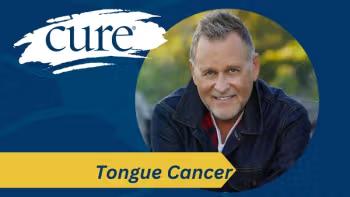
Adjusting to Life With Head and Neck Cancer

Transcript:
Meryl Kaufman, M.Ed., CCC-SLP, BRS-S: What other advice do you have for survivors in terms of getting back into the community or adjusting to their life after treatment for laryngectomy?
Itzhak Brook, M.D., M.Sc.: My major advice is to try to come back to life again, and that is not always easy. Head and neck cancer, in contrast with other cancers, is something that people wear on their face and neck. People see that we had cancer. We don’t look the same; we don’t speak the same. For some of us, it is a deformity or a hole in the neck. That’s important to learn to cope with, and that is not an easy thing to do, but it’s possible because the most important thing is to turn this adverse event in our life into something we can grow with and be different but still enjoy life. So, my advice is to go out, go back to work, do or go back if you’re retired to an activity you like, engage with your family and friends, children and grandchildren and try to stay active. As I said, there are support groups for this everywhere in the country, in the world. And that’s something that people should do to get support.
There are also professionals who can help us, such as social workers, psychologists and psychiatrists. One of the major issues that patients have to deal with is depression and not only depression but many other issues that relate to the psychological adjustment to the reality. Fear of recurrence is very scary. I know that the first few years when I had my annual CT and PET scans, I was always scared: Will recurrence come? Fortunately, in my case, it didn’t, but the anxiety came back every time. Also, in the beginning, every symptom I had like pain or ache or difficulty—oh well, cancer may return, and it’s absolutely normal. My physician accepted it, and all the time, I realized that I don’t have to rush with every symptom and not everything is recurrence. But it’s a difficulty and a challenge.
Unfortunately, a patient with head and neck cancer suffers from the second-highest rate of suicide after lung cancer. And that’s something important to know, especially for people who cannot speak. Because not being able to speak cuts you from society, doesn’t allow a person to express their feelings and emotions. And they become isolated, and it’s important to recognize it and intervene early. The medication that even being in a support group is like psychotherapy, and it’s very, very important. It’s important to take care of not only the illness but also the mind, and that is possible, and many people are getting help.
Meryl Kaufman, M.Ed., CCC-SLP, BRS-S: Dr. Brook, you mentioned how important it is to have a caretaker by your side and an advocate by your side. We know that the burden can become somewhat heavy for those caretakers themselves. What advice do you have for caring for the caretaker of the head and neck cancer patient?
Itzhak Brook, M.D., M.Sc.: Many of the caretakers—they can be friends, family members—bear the burden of the patient. They put the patient above themselves, the need of the patient, and they often will get neglected. They, too, are suffering from anxiety, fear and depression, and it’s important they take all the emotions that the patient throws at them. So, it’s very, very important to find them support and to understand the kind of challenges that they face. They, too, have support groups, and they, too, should be encouraged to go there and seek support for their difficult and challenging job that actually sustains the patient, but they need to sustain themselves as well.
One of the important things for patients is to try to change this adverse effect in their life to something positive, and there are many ways they can do it. And if they can cope and help other patients, they can go out and give talks in high schools or colleges to encourage young people not to drink or smoke or engage in other risky behaviors. And they can also try to make that experience helpful to others as much as they can, like visiting patients who are going through the procedure and going to a support group to help. All those things are very important because they may give the patient a feeling that they’re still maybe helping others. They can contribute to society, and they also will get some help for their isolation and depression. So, a proactive way is very crucial in the patient recovery.
Meryl Kaufman, M.Ed., CCC-SLP, BRS-S: Absolutely. I agree. And it also helps to minimize some of the stigma associated with the head and neck cancers when college students, children and people in the community see you as an example of somebody who can overcome a disability or a challenge in life and still continue to go on and live your life to its fullest. So, I think that it serves both purposes. It’s helping to give meaning to the cancer and the struggle that you’ve been through, as well as helping to make this more mainstream and more acceptable to people, which, in the end, hopefully will help encourage early diagnosis, awareness, detection and all those things that are so important to help fight this disease. So, this has been a great discussion on seeing head and neck cancer through the eyes of a patient. Thank you, Dr. Brook, for joining us today and sharing your story and to our viewers here at CURE Connections®. Thank you for watching.
Transcript Edited for Clarity


